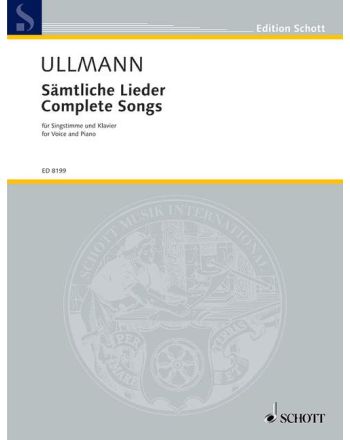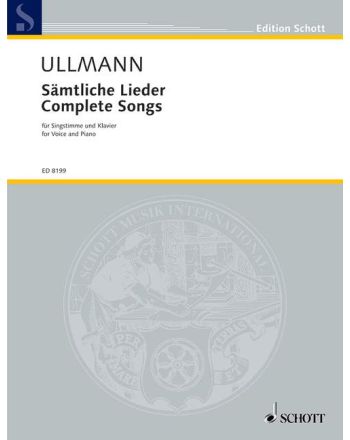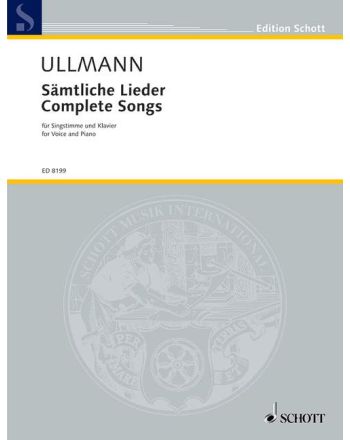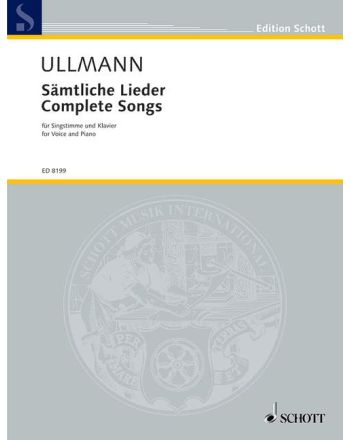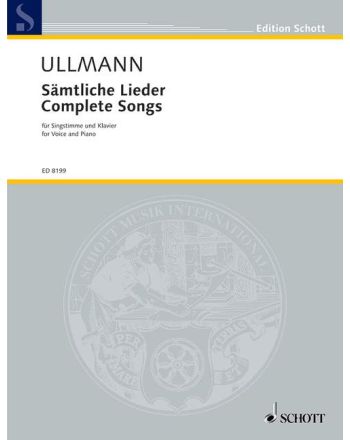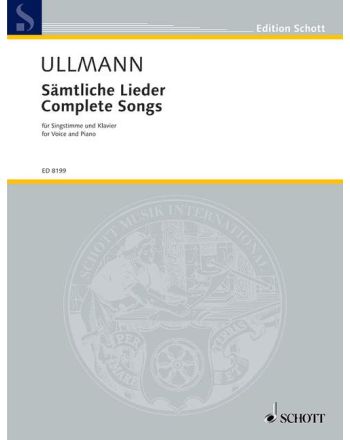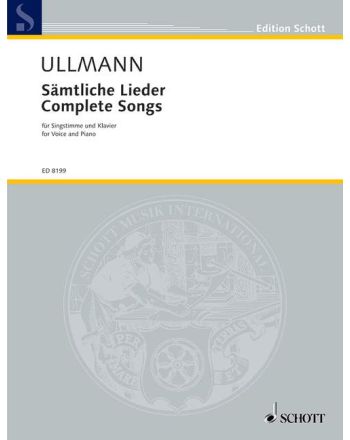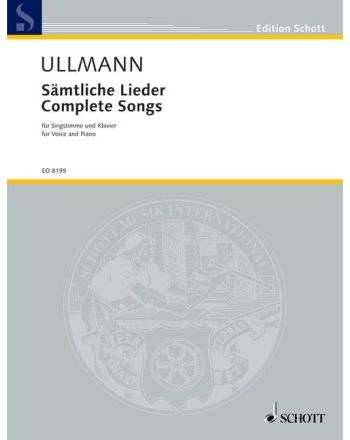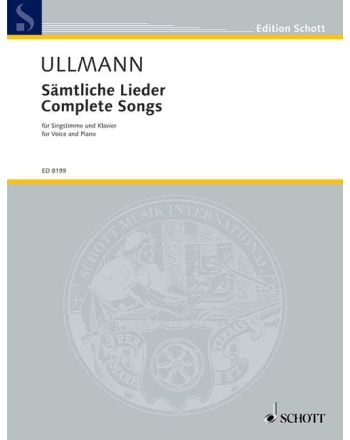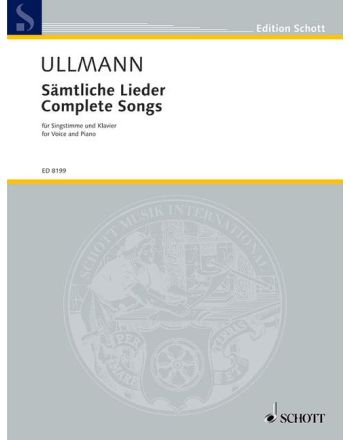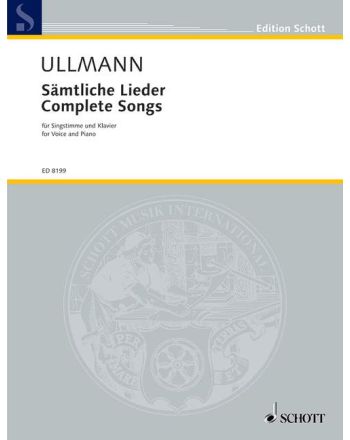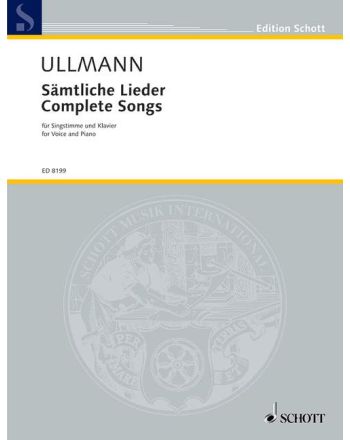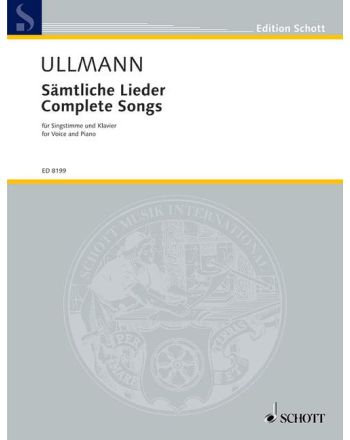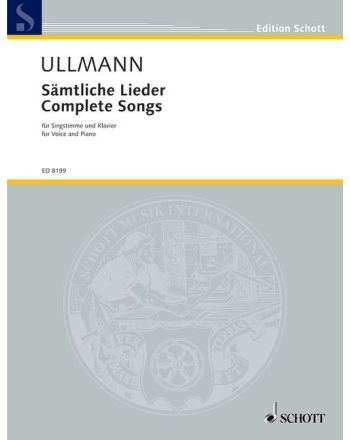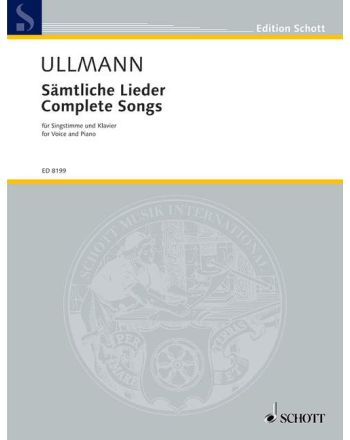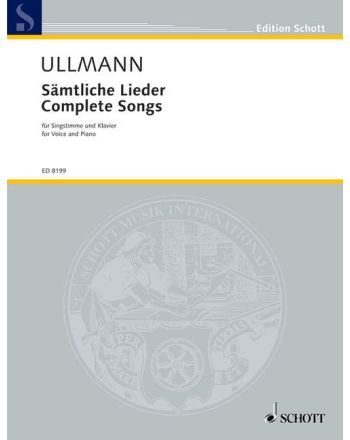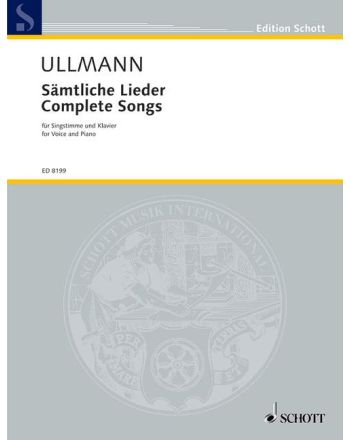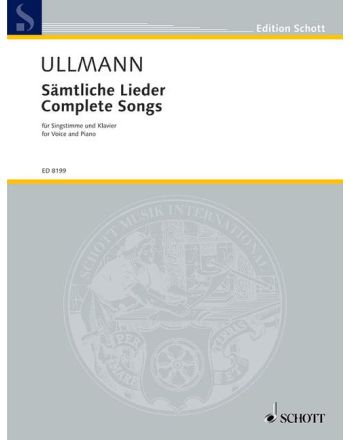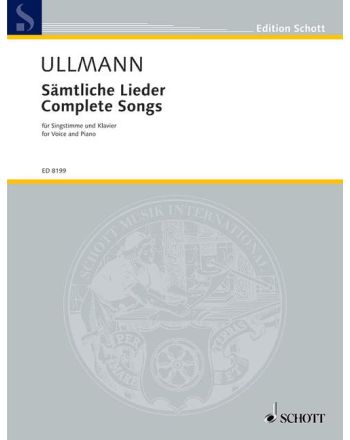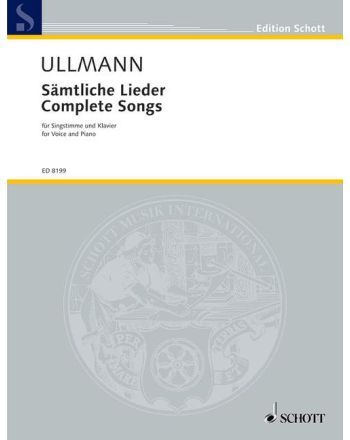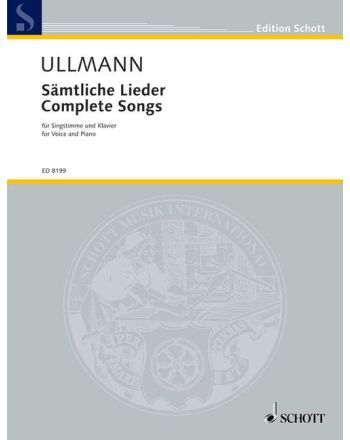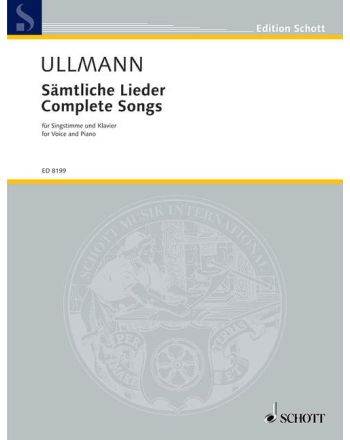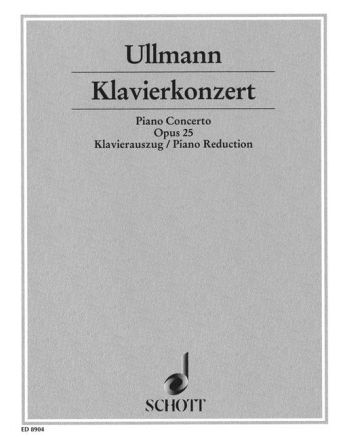
Viktor Ullmann
About Viktor Ullmann
I have written quite a lot of new music in Theresienstadt: it must be underlined … that we do not merely sit on the banks of the waters of Babylon, and that our endeavour with respect for arts was commensurate with our will to live. (Viktor Ullmann)
Viktor Ullmann was born in Teschen (Cieszyn) on 1 January 1898. He moved with his mother to Vienna in 1909 where he received his first lessons in music theory with Josef Polnauer in 1914. In 1916, he was called up to perform his military service. After the end of the war, he initially enrolled to study law at the University of Vienna, but also participated in Arnold Schoenberg’s composition seminars in Mödling from October 1918. He additionally received further piano tuition from Eduard Steuermann. Following Schoenberg’s recommendation, he was admitted into the foundation committee of the "Verein für musikalische Privataufführungen” [Society for Private Musical Performance] on 6 December 1918, but relocated to Prague a year later. Following further tuition in composition with Heinrich Jalowetz, he took over Anton Webern’s position as choir director and répétiteur at the New German Theatre in 1920 where, two years later, he was promoted to the position of Kapellmeister by Alexander von Zemlinsky. In 1927, Ullmann became head of opera for one season in Aussig and subsequently undertook an engagement as Kapellmeister and composer of incidental music from 1929 to 1931 at the Schauspielhaus in Zurich. Influenced by Rudolf Steiner’s anthroposophy, Ullmann later managed an anthroposophic bookshop for two years in Stuttgart (1931/32) before returning to Prague as a freelance musician, teacher, composer and journalist. He attended Alois Hába’s courses in quartertone composition between 1935 and 1937. Following the establishment of the “German Protectorate of Bohemia and Moravia” in 1939, all public performances of composers of Jewish origin were prohibited. Ullmann was incarcerated in the concentration camp Theresienstadt on 8 September 1942 where he undertook the organisation of the so-called "Freizeitgestaltung" [leisure time administration] together with Hans Krása, Gideon Klein and Rafael Schächter. On 16 October 1944, Ullmann was deported to Auschwitz where he was killed only a few days later.
The rediscovery of Ullmann’s works has a direct connection with the success story of the Kaiser von Atlantis. Ullmann composed this one-act opera in 1943/44 against the background of his impressions of the Theresienstadt ghetto. The libretto was written by one of his fellow inmates Peter Kien: as a result of war and mass slaughter, death refuses to carry out its services. The dictator who has thereby lost his greatest weapon – deterrence – loses all his powers. Death only regains its real purpose at the end and becomes the comforter of humans. Unlike the melodrama Die Weise von Liebe und Tod des Cornet Christoph Rilke for narrator and piano or orchestra based on a text by Rilke (1944), the opera was not performed in Theresienstadt and the posthumous première did not take place until 1975 in Amsterdam.
Ullmann did however achieve consummate success during his lifetime with his Schoenberg Variations: the Variationen und Doppelfuge über ein Thema von Arnold Schönberg have survived in two versions for piano (1929 and 1933/34) in addition to versions for string quartet (1939) and orchestra (1934) and among Ullmann’s entire output display the greatest affinity to the Second Viennese School. A large proportion of Ullmann’s compositions from the 1920s and 1930s must be considered as having been lost, but surviving works include the Concerto for piano and orchestra (1939) and the seven Piano Sonatas, of which Nos. 5 and 7 also exist as a reconstructed symphony. The broad spectrum of Ullmann’s compositional development can be observed in the Lieder for voice and piano: from Wendla im Garten based on Wedekind’s “Frühlings Erwachen” (1918/1943) and the Liederbuch des Hafis based on Bethge (1940) to the Hölderlin Lieder composed in Theresienstadt, Late Romantic influences can be discerned alongside echoes of Zemlinsky’s tonal language and the Neue Sachlichkeit [New Objectivity] of Kurt Weill.
Ullmann was awarded the Hertzka Prize for his compositions on two occasions: 1934 for the orchestral version of the Schoenberg Variations and 1936 for the opera Der Sturz des Antichrist composed a year previously on a libretto by Albert Steffens.
Worklist
Gallery
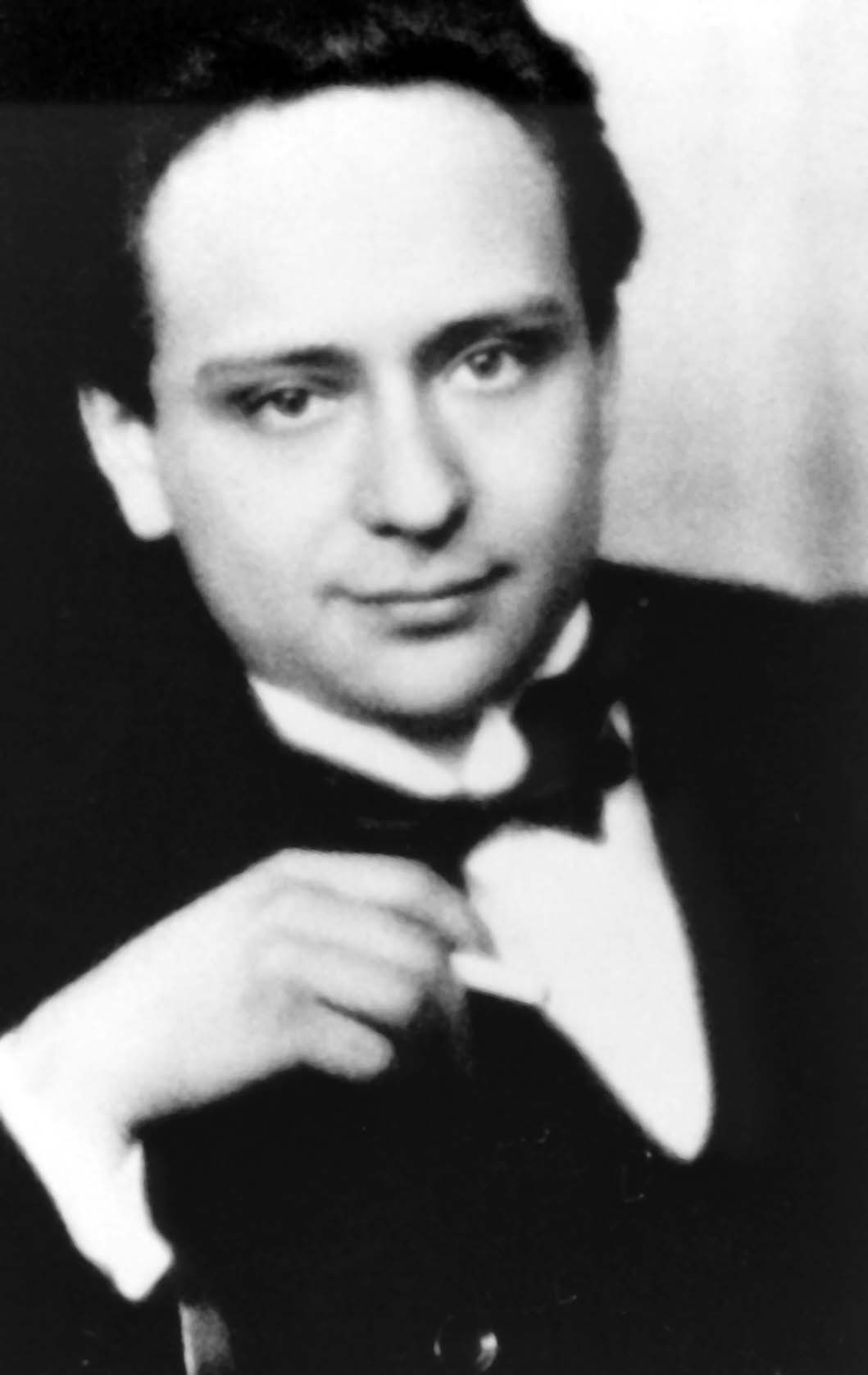

Chronology
Übersiedlung mit der Mutter nach Wien
Klavierunterricht bei Eduard Steuermann
Immatrikulation als Jurastudent an der Wiener Universität
Ende des Jahres tritt Ullmann in Arnold Schönbergs Kompositionsseminar ein
Am 6. Dezember auf Vorschlag Schönbergs Aufnahme in den Gründungsvorstand des "Vereins für musikalische Privataufführungen"
Die zahlreichen in dieser Zeit entstandenen Kompositionen müssen mit Ausnahme einer späteren Fassung der "Variationen, Phantasie und Doppelfuge über ein kleines Klavierstück von Arnold Schönberg" - als verloren gelten
Nach der Machtergreifung flieht er mit seiner Frau und dem einjährigen Sohn Max nach Prag; dort arbeitet er ab Mitte 1933 wieder als freischaffender Musiker
Mitarbeit in Leo Kestenbergs "Internationaler Gesellschaft für Musikerziehung"
Verhandlungen über geplante Aufführungen (Wien 1935 und Prag 1937) sind erfolglos
Am 8. September werden Ullmann, seine dritte Frau Elisabeth (gemeinsam mit einer Tochter aus ihrer ersten Ehe) und seine erste Frau Martha in das Konzentrationslager Theresienstadt deportiert
Ullmann arbeitet in Theresienstadt intensiv musikalisch weiter als Komponist, Interpret und Rezensent; er leitet das "Studio für neue Musik", das das musikalische Leben in Theresienstadt prägt. es entstehen neben vielen anderen verlorenen Werken u. a. die Oper "Der Kaiser von Atlantis" und das "3. Strecihquartett"
Zuvor übergibt er die Theresienstädter Manuskripte noch seinem Freund Emil Utitz mit der Bitte, sie – für den Fall, dass beide überleben – an Hans Günther Adler weiterzureichen
Products
-
from: Brezulinka. Drei jiddische LiederComposer: Viktor UllmannEditor: Axel Bauni | Christian HoeschMedia Type: E-score PDFBrand: Schott Music
Instrumentation: voice and pianoLanguage: German, English, FrenchProduct number: ED 8199 Q7538£2.99available for download immediately -
from: Hölderlin-LiederComposer: Viktor UllmannEditor: Axel Bauni | Christian HoeschMedia Type: E-score PDFBrand: Schott Music
Instrumentation: high voice and pianoLanguage: German, English, FrenchProduct number: ED 8199 Q7535£2.99available for download immediately -
from: Fünf Liebeslieder nach Ricarda HuchComposer: Viktor UllmannEditor: Axel Bauni | Christian HoeschMedia Type: E-score PDFBrand: Schott Music
Instrumentation: soprano and pianoLanguage: German, English, FrenchProduct number: ED 8199 Q7490£2.99available for download immediately -
from: Sechs Lieder nach Gedichten von Albert SteffenComposer: Viktor UllmannEditor: Axel Bauni | Christian HoeschMedia Type: E-score PDFBrand: Schott Music
Instrumentation: soprano and pianoLanguage: German, English, FrenchProduct number: ED 8199 Q7483£2.99available for download immediately -
Der Kaiser von AtlantisComposer: Viktor UllmannEditor: Claudia EderMedia Type: E-score PDFBrand: Schott Music
Instrumentation: baritone or bass and pianoLanguage: GermanProduct number: ED 21142 Q25313£2.99available for download immediately -
from: Sechs Lieder nach Gedichten von Albert SteffenComposer: Viktor UllmannEditor: Axel Bauni | Christian HoeschMedia Type: E-score PDFBrand: Schott Music
Instrumentation: soprano and pianoLanguage: German, English, FrenchProduct number: ED 8199 Q7488£2.99available for download immediately -
Sonnet XVIIIComposer: Viktor UllmannEditor: Axel Bauni | Christian HoeschMedia Type: E-score PDFBrand: Schott Music
Instrumentation: high voice and pianoLanguage: German, English, FrenchProduct number: ED 8199 Q7511£2.99available for download immediately -
from: Brezulinka. Drei jiddische LiederComposer: Viktor UllmannEditor: Axel Bauni | Christian HoeschMedia Type: E-score PDFBrand: Schott Music
Instrumentation: voice and pianoLanguage: German, English, FrenchProduct number: ED 8199 Q7536£2.99available for download immediately -
from: Liederbuch des HafisComposer: Viktor UllmannEditor: Axel Bauni | Christian HoeschMedia Type: E-score PDFBrand: Schott Music
Instrumentation: bass and pianoLanguage: German, English, FrenchProduct number: ED 8199 Q7504£2.99available for download immediately -
from: Der Mensch und sein TagComposer: Viktor UllmannEditor: Axel Bauni | Christian HoeschMedia Type: E-score PDFBrand: Schott Music
Instrumentation: baritone and pianoLanguage: German, English, FrenchProduct number: ED 8199 Q7520£2.99available for download immediately -
3 Yiddish SongsComposer: Viktor UllmannEditor: David BlochMedia Type: Sheet musicBrand: Schott Music
Instrumentation: high Voice and PianoProduct number: ED 8754£8.50Not in stock, but can be ordered -
Sonett XXVIIIComposer: Viktor UllmannEditor: Axel Bauni | Christian HoeschMedia Type: E-score PDFBrand: Schott Music
Instrumentation: soprano and pianoLanguage: German, English, FrenchProduct number: ED 8199 Q7500£2.99available for download immediately -
from: Geistliche LiederComposer: Viktor UllmannEditor: Axel Bauni | Christian HoeschMedia Type: E-score PDFBrand: Schott Music
Instrumentation: high voice and pianoLanguage: German, English, FrenchProduct number: ED 8199 Q7499£2.99available for download immediately -
Sonnet VComposer: Viktor UllmannEditor: Axel Bauni | Christian HoeschMedia Type: E-score PDFBrand: Schott Music
Instrumentation: high voice and pianoLanguage: German, English, FrenchProduct number: ED 8199 Q7507£2.99available for download immediately -
Composer: Viktor UllmannEditor: Axel Bauni | Christian HoeschSeries: Edition Schott
Brand: Schott Music
Instrumentation: voice and pianoProduct number: ED 8199Product TypeAs low as £33.99 -
from: Hölderlin-LiederComposer: Viktor UllmannEditor: Axel Bauni | Christian HoeschMedia Type: E-score PDFBrand: Schott Music
Instrumentation: high voice and pianoLanguage: German, English, FrenchProduct number: ED 8199 Q7534£2.99available for download immediately -
from: Der Mensch und sein TagComposer: Viktor UllmannEditor: Axel Bauni | Christian HoeschMedia Type: E-score PDFBrand: Schott Music
Instrumentation: baritone and pianoLanguage: German, English, FrenchProduct number: ED 8199 Q7519£2.99available for download immediately -
from: Drei chinesische Lieder IIComposer: Viktor UllmannEditor: Axel Bauni | Christian HoeschMedia Type: E-score PDFBrand: Schott Music
Instrumentation: voice and pianoLanguage: German, English, FrenchProduct number: ED 8199 Q7530£2.99available for download immediately -
from: Der Mensch und sein TagComposer: Viktor UllmannEditor: Axel Bauni | Christian HoeschMedia Type: E-score PDFBrand: Schott Music
Instrumentation: baritone and pianoLanguage: German, English, FrenchProduct number: ED 8199 Q7522£2.99available for download immediately -
Oper nach Heinrich von Kleist in einem AktProduct TypeAs low as £45.99
-
from: Geistliche LiederComposer: Viktor UllmannEditor: Axel Bauni | Christian HoeschMedia Type: E-score PDFBrand: Schott Music
Instrumentation: high voice and pianoLanguage: German, English, FrenchProduct number: ED 8199 Q7495£2.99available for download immediately -
from: Drei LiederComposer: Viktor UllmannEditor: Axel Bauni | Christian HoeschMedia Type: E-score PDFBrand: Schott Music
Instrumentation: baritone and pianoLanguage: German, English, FrenchProduct number: ED 8199 Q7515£2.99available for download immediately -
12 Pieces from the Poem of Rainer Maria RilkeComposer: Viktor UllmannEditor: Henning BrauelEdition: (Piano Version)Brand: Schott Music
Instrumentation: speakers and piano or orchestraProduct number: ED 8285Product TypeAs low as £23.99 -
from: Sechs Lieder nach Gedichten von Albert SteffenComposer: Viktor UllmannEditor: Axel Bauni | Christian HoeschMedia Type: E-score PDFBrand: Schott Music
Instrumentation: soprano and pianoLanguage: German, English, FrenchProduct number: ED 8199 Q7484£2.99available for download immediately -
from: Sechs Lieder nach Gedichten von Albert SteffenComposer: Viktor UllmannEditor: Axel Bauni | Christian HoeschMedia Type: E-score PDFBrand: Schott Music
Instrumentation: soprano and pianoLanguage: German, English, FrenchProduct number: ED 8199 Q7485£2.99available for download immediately -
FragmentComposer: Viktor UllmannEditor: Axel Bauni | Christian HoeschMedia Type: E-score PDFBrand: Schott Music
Instrumentation: voice and sting trio; Piano ReductionLanguage: German, English, FrenchProduct number: ED 8199 Q7541£2.99available for download immediately -
from: Sechs Lieder nach Gedichten von Albert SteffenComposer: Viktor UllmannEditor: Axel Bauni | Christian HoeschMedia Type: E-score PDFBrand: Schott Music
Instrumentation: soprano and pianoLanguage: German, English, FrenchProduct number: ED 8199 Q7486£2.99available for download immediately -
from: Geistliche LiederComposer: Viktor UllmannEditor: Axel Bauni | Christian HoeschMedia Type: E-score PDFBrand: Schott Music
Instrumentation: high voice and pianoLanguage: German, English, FrenchProduct number: ED 8199 Q7498£2.99available for download immediately -
from: Der Mensch und sein TagComposer: Viktor UllmannEditor: Axel Bauni | Christian HoeschMedia Type: E-score PDFBrand: Schott Music
Instrumentation: baritone and pianoLanguage: German, English, FrenchProduct number: ED 8199 Q7516£2.99available for download immediately -
from: Der Mensch und sein TagComposer: Viktor UllmannEditor: Axel Bauni | Christian HoeschMedia Type: E-score PDFBrand: Schott Music
Instrumentation: baritone and pianoLanguage: German, English, FrenchProduct number: ED 8199 Q7523£2.99available for download immediately -
from: Der Mensch und sein TagComposer: Viktor UllmannEditor: Axel Bauni | Christian HoeschMedia Type: E-score PDFBrand: Schott Music
Instrumentation: baritone and pianoLanguage: German, English, FrenchProduct number: ED 8199 Q7517£2.99available for download immediately -
from: Der Mensch und sein TagComposer: Viktor UllmannEditor: Axel Bauni | Christian HoeschMedia Type: E-score PDFBrand: Schott Music
Instrumentation: baritone and pianoLanguage: German, English, FrenchProduct number: ED 8199 Q7518£2.99available for download immediately -
Composer: Viktor UllmannEditor: Axel Bauni | Christian HoeschMedia Type: E-score PDFBrand: Schott Music
Instrumentation: medium (low) voice and pianoLanguage: German, English, FrenchProduct number: ED 8199 Q7539£2.99available for download immediately -
Sonnet VIIIComposer: Viktor UllmannEditor: Axel Bauni | Christian HoeschMedia Type: E-score PDFBrand: Schott Music
Instrumentation: high voice and pianoLanguage: German, English, FrenchProduct number: ED 8199 Q7509£2.99available for download immediately -
from: Der Mensch und sein TagComposer: Viktor UllmannEditor: Axel Bauni | Christian HoeschMedia Type: E-score PDFBrand: Schott Music
Instrumentation: baritone and pianoLanguage: German, English, FrenchProduct number: ED 8199 Q7524£2.99available for download immediately -
from: Immer inmitten. Solo-KantateComposer: Viktor UllmannEditor: Axel Bauni | Christian HoeschMedia Type: E-score PDFBrand: Schott Music
Instrumentation: mezzo-soprano and pianoLanguage: German, English, FrenchProduct number: ED 8199 Q7531£2.99available for download immediately -
from: Der Mensch und sein TagComposer: Viktor UllmannEditor: Axel Bauni | Christian HoeschMedia Type: E-score PDFBrand: Schott Music
Instrumentation: baritone and pianoLanguage: German, English, FrenchProduct number: ED 8199 Q7521£2.99available for download immediately -
from: Geistliche LiederComposer: Viktor UllmannEditor: Axel Bauni | Christian HoeschMedia Type: E-score PDFBrand: Schott Music
Instrumentation: high voice and pianoLanguage: German, English, FrenchProduct number: ED 8199 Q7496£2.99available for download immediately -
Chanson des enfants francais IComposer: Viktor UllmannEditor: Axel Bauni | Christian HoeschMedia Type: E-score PDFBrand: Schott Music
Instrumentation: high voice and pianoLanguage: German, English, FrenchProduct number: ED 8199 Q7528£2.99available for download immediately -
from: Liederbuch des HafisComposer: Viktor UllmannEditor: Axel Bauni | Christian HoeschMedia Type: E-score PDFBrand: Schott Music
Instrumentation: bass and pianoLanguage: German, English, FrenchProduct number: ED 8199 Q7506£2.99available for download immediately -
Sonnet XIIComposer: Viktor UllmannEditor: Axel Bauni | Christian HoeschMedia Type: E-score PDFBrand: Schott Music
Instrumentation: high voice and pianoLanguage: German, English, FrenchProduct number: ED 8199 Q7510£2.99available for download immediately -
from: aus: Brezulinka. Drei jiddische LiederComposer: Viktor UllmannEditor: Axel Bauni | Christian HoeschMedia Type: E-score PDFBrand: Schott Music
Instrumentation: voice and pianoLanguage: German, English, FrenchProduct number: ED 8199 Q7537£2.99available for download immediately -
from: Geistliche LiederComposer: Viktor UllmannEditor: Axel Bauni | Christian HoeschMedia Type: E-score PDFBrand: Schott Music
Instrumentation: high voice and pianoLanguage: German, English, FrenchProduct number: ED 8199 Q7497£2.99available for download immediately -
from: Der Mensch und sein TagComposer: Viktor UllmannEditor: Axel Bauni | Christian HoeschMedia Type: E-score PDFBrand: Schott Music
Instrumentation: baritone and pianoLanguage: German, English, FrenchProduct number: ED 8199 Q7526£2.99available for download immediately -
from: Fünf Liebeslieder nach Ricarda HuchComposer: Viktor UllmannEditor: Axel Bauni | Christian HoeschMedia Type: E-score PDFBrand: Schott Music
Instrumentation: soprano and pianoLanguage: German, English, FrenchProduct number: ED 8199 Q7493£2.99available for download immediately -
Sonnet XIIIComposer: Viktor UllmannEditor: Axel Bauni | Christian HoeschMedia Type: E-score PDFBrand: Schott Music
Instrumentation: high voice and pianoLanguage: German, English, FrenchProduct number: ED 8199 Q7512£2.99available for download immediately -
Sonnet VIIComposer: Viktor UllmannEditor: Axel Bauni | Christian HoeschMedia Type: E-score PDFBrand: Schott Music
Instrumentation: high voice and pianoLanguage: German, English, FrenchProduct number: ED 8199 Q7508£2.99available for download immediately -
Composer: Viktor UllmannMedia Type: Sheet musicEdition: for 2 pianosSeries: Klavierkonzert
Brand: Schott Music
Instrumentation: piano and orchestraProduct number: ED 8904£36.99In stock - usually despatched (or ready for collection) within 1 working day -
Vol. 2 | No. 5-7Composer: Viktor UllmannEditor: Konrad RichterSeries: Edition Schott
Klaviersonaten , Vol. 2
Brand: Schott Music
Instrumentation: pianoProduct number: ED 8282Product TypeAs low as £29.99 -
Vol. 1 | No. 1-4Composer: Viktor UllmannEditor: Konrad RichterSeries: Klaviersonaten , Vol. 1
Brand: Schott Music
Instrumentation: pianoProduct number: ED 8281Product TypeAs low as £33.99

